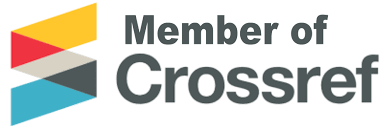Switching Free Users to Paid Users: How to Increase Purchase Intention In Edtech Industry
Abstract
Keywords
Full Text:
PDFReferences
Akbar, R. M. I., Sularso, R. A., & Indraningrat, K. (2020). The Effect of Price, Ease of Transaction, Information Quality, Safety, and Trust on Online Purchase Decision. E-Journal Ekonomi Bisnis Dan Akuntansi, 7(1), 77. https://doi.org/10.19184/ejeba.v7i1.14956
Alalwan, A. A. (2018). Investigating the impact of social media advertising features on customer purchase intention. International Journal of Information Management, 42(June), 65–77. https://doi.org/10.1016/j.ijinfomgt.2018.06.001
Bhardwaj, Riaz; Yarrow, Noah; Cali, M. (2020). Edtech in Indonesia – Ready for Take-Off? World Bank, May, 1–84. www.worldbank.org
Cai, S., Luo, Q., Fu, X., & Fang, B. (2020). What drives the sales of paid knowledge products? A two-phase approach. Information and Management, 57(5). https://doi.org/10.1016/j.im.2019.103264
Chen, L., Xu, P., & Liu, D. (2020). Effect of Crowd Voting on Participation in Crowdsourcing Contests. Journal of Management Information Systems, 37(2), 510–535. https://doi.org/10.1080/07421222.2020.1759342
Chen, Y., Ding, D., Meng, L., Li, X., & Zhang, S. (2021). Understanding consumers’ purchase intention towards online paid courses. Information Development. https://doi.org/10.1177/02666669211027206
Escobar-RodrÃguez, T., & Bonsón-Fernández, R. (2017). Analysing online purchase intention in Spain: fashion e-commerce. Information Systems and E-Business Management, 15(3), 599–622. https://doi.org/10.1007/s10257-016-0319-6
Ghavipour, M., & Meybodi, M. R. (2018). A dynamic algorithm for stochastic trust propagation in online social networks: Learning automata approach. Computer Communications, 123(January), 11–23. https://doi.org/10.1016/j.comcom.2018.04.004
Hair, Joe F., Sarstedt, M., Ringle, C. M., & Mena, J. A. (2012). An assessment of the use of partial least squares structural equation modeling in marketing research. Journal of the Academy of Marketing Science, 40(3), 414–433. https://doi.org/10.1007/s11747-011-0261-6
Hair, Joseph F., Hult, G. T., Ringle, C., & Sarstedt, M. (2017). A Primer on Partial Least Squares Structural Equation Modeling (PLS-SEM) - Joseph F. Hair, Jr., G. Tomas M. Hult, Christian Ringle, Marko Sarstedt. In Sage.
Hossain, M. S., Shofiqul Islam, M., Glinsky, J. V., Lowe, R., Lowe, T., & Harvey, L. A. (2015). A massive open online course (MOOC) can be used to teach physiotherapy students about spinal cord injuries: A randomised trial. Journal of Physiotherapy, 61(1), 21–27. https://doi.org/10.1016/j.jphys.2014.09.008
Kazancoglu, I., & Aydin, H. (2018). An investigation of consumers’ purchase intentions towards omni-channel shopping: A qualitative exploratory study. International Journal of Retail and Distribution Management, 46(10), 959–976. https://doi.org/10.1108/IJRDM-04-2018-0074
Liao, C., Lin, H. N., Luo, M. M., & Chea, S. (2017). Factors influencing online shoppers’ repurchase intentions: The roles of satisfaction and regret. Information and Management, 54(5), 651–668. https://doi.org/10.1016/j.im.2016.12.005
Loureiro, S. M. C., Cavallero, L., & Miranda, F. J. (2018). Fashion brands on retail websites: Customer performance expectancy and e-word-of-mouth. Journal of Retailing and Consumer Services, 41(November 2017), 131–141. https://doi.org/10.1016/j.jretconser.2017.12.005
Lu, Y., Wang, B., & Lu, Y. (2019). Understanding key drivers of MOOC satisfaction and continuance intention to use. Journal of Electronic Commerce Research, 20(2), 105–117.
Oh, J., & Yoon, S. J. (2014). Validation of Haptic Enabling Technology Acceptance Model (HE-TAM): Integration of IDT and TAM. Telematics and Informatics, 31(4), 585–596. https://doi.org/10.1016/j.tele.2014.01.002
Paechter, M., Maier, B., & Macher, D. (2010). Students’ expectations of, and experiences in e-learning: Their relation to learning achievements and course satisfaction. Computers and Education, 54(1), 222–229. https://doi.org/10.1016/j.compedu.2009.08.005
Peinkofer, S. T., Esper, T. L., & Howlett, E. (2016). Hurry! Sale Ends Soon: The Impact of Limited Inventory Availability Disclosure on Consumer Responses to Online Stockouts. Journal of Business Logistics, 37(3), 231–246. https://doi.org/10.1111/jbl.12136
Shin, D. (2021). Embodying algorithms, enactive artificial intelligence and the extended cognition: You can see as much as you know about algorithm. Journal of Information Science. https://doi.org/10.1177/0165551520985495
Tartarini, G., Barbiroli, M., Fuschini, F., Degli Esposti, V., & Masotti, D. (2013). Consolidating the electromagnetic education of graduate students through an integrated course. IEEE Transactions on Education, 56(4), 416–423. https://doi.org/10.1109/TE.2013.2247762
Umair Manzoor, Sajjad Ahmad Baig, Muhammad Hashim, & Abdul Sami. (2020). Impact of Social Media Marketing on Consumer’s Purchase Intentions: The Mediating role of Customer Trust. International Journal of Entrepreneurial Research, 3(2), 41–48. https://doi.org/10.31580/ijer.v3i2.1386
Venkatesh, V. (2012). C ONSUMER A CCEPTANCE AND U SE OF I NFORMATION T ECHNOLOGY : E XTENDING THE U NIFIED T HEORY. 36(1), 157–178.
Wang, S., Wang, J., Yang, F., Li, J., & Song, J. (2020). Determinants of consumers’ remanufactured products purchase intentions: Evidence from China. International Journal of Production Research, 58(8), 2368–2383. https://doi.org/10.1080/00207543.2019.1630767
Yang, X., Liu, N., & Teo, H. H. (2017). How do users cope with trial restrictions? A field experiment on free trial software. International Journal of Information Management, 37(4), 339–349. https://doi.org/10.1016/j.ijinfomgt.2017.03.007
Yeo, V. C. S., Goh, S. K., & Rezaei, S. (2017). Consumer experiences, attitude and behavioral intention toward online food delivery (OFD) services. Journal of Retailing and Consumer Services, 35(July 2016), 150–162. https://doi.org/10.1016/j.jretconser.2016.12.013
Yu, L., Chen, Z., Yao, P., & Liu, H. (2021). A study on the factors influencing users’ online knowledge paying-behavior based on the utaut model. Journal of Theoretical and Applied Electronic Commerce Research, 16(5), 1768–1790. https://doi.org/10.3390/jtaer16050099
Zhang, J., Zhang, J., & Zhang, M. (2019). From free to paid: Customer expertise and customer satisfaction on knowledge payment platforms. Decision Support Systems, 127(August), 113140. https://doi.org/10.1016/j.dss.2019.113140
Zhang, M., Zhang, Y., Zhao, L., & Li, X. (2020). What drives online course sales? Signaling effects of user-generated information in the paid knowledge market. Journal of Business Research, 118(July), 389–397. https://doi.org/10.1016/j.jbusres.2020.07.008
DOI: https://doi.org/10.35314/inovbiz.v11i2.3429
Refbacks
- There are currently no refbacks.
Copyright (c) 2024 Widi Senalasari, Putri Amelia, Putri Amelia

This work is licensed under a Creative Commons Attribution-NonCommercial-ShareAlike 4.0 International License.
This Journal has been listed and indexed in :
Copyright of Jurnal Inovasi Bisnis (p-ISSN : 2338-4840, e-ISSN : 2614-6983)

Inovbiz: Jurnal Inovasi Bisnis is licensed under a Creative Commons Attribution-NonCommercial-ShareAlike 4.0 International License.
Editorial Office :
Pusat Penelitian dan Pengabdian kepada Masyarakat
 Politeknik Negeri BengkalisÂ
Jl. Bathin alam, Sungai Alam Bengkalis-Riau 28711Â
E-mail: inovbiz@polbeng.ac.id














